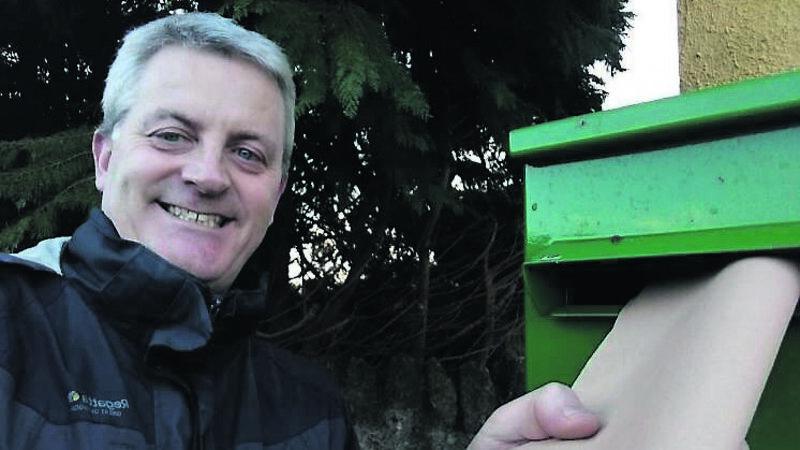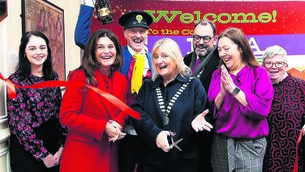Amid Brexit chaos, I've been told I face a YEAR-LONG wait to be an Irish citizen

IT was the celebrated poet Patrick Kavanagh who once remarked that there are more than 30 words in the Irish language which approximate to the Spanish word ‘mañana’.
But, he added mischievously, somehow none of them convey the same sense of urgency...
He was playing on the Irish reputation — whether founded on truth or lies — to be so laid back as to be comatose. Or, as one of those slogans emblazoned on those green jumpers in Irish tourism shops has it: ‘I’m not late, I’m on Irish time’.
Ha ha, says you. If the Yanks and Brits want to believe it, that’s their look-out. The till’s over there.
As a blow-in here myself from across the Irish Sea, I can attest to witnessing a certain relaxed attitude among some Irish, but it seems very much a rural trait.
The mañana trait came to mind this week when I made a call to the Department of Foreign Affairs, to obtain an update on my application to be an Irish citizen.
Quick recap: Back in February, I applied to join the Foreign Births Registry, on the basis that I have an Irish grandparent. It offered the cheapest and shortest route to me obtaining an Irish passport, and I was concerned at the time about the effects of a hard Brexit on my travel plans.
When I submitted the application on February 5, the Department pinged back an email advising me that “applications to the Foreign Births Registry can take up to six months to process”.
Fast forward six months, and with the threat of a hard Brexit now greater than ever, I thought I had better check on the progress of my application. It must be nearly done by now...
Did I say progress? Oh dear.
The fact I was on hold ahead of 15 other callers and had to endure a 20-minute wait to talk to an advisor should have alerted me that bad news lay ahead.
Sure enough, I was told the six months had now become 12. The guy must have detected my surprise down the line as he added there was a chance it could be this year... but that the goalposts had been moved back to 12 months.
Bloody mañana, I must admit, was my first reaction. Can’t these bureaucrats get a move on?
But, wearing my journalist’s hat, I decided to delve a little deeper, and I discovered that this newly-extended delay was not the fault of bureaucrats up in Dublin having siestas and chatting to Saoirse and Mick at the water cooler.
This was down to a fully-fledged, Brexit-fuelled British stampede! And I had got caught up in the mad rush!
I sent a list of queries to the Department of Foreign Affairs, and their answers provided an illuminating insight into the extent of this race to claim Irish citizenship. Yes, they acknowledged, in not so many words, they had been swamped by a flurry of British applications in recent times. The spokesperson didn’t go as far as the advisor on the phone, accepting that the Foreign Birth Registration process takes “approximately 6-9 months” — still a step back from the “six months” I had been told back in February.
However, they added, “complex applications can take up to 12 months to process”. I’m not sure what was “complex” about my straightforward application, but we’ll let that lie.
The spokesperson went on: “Until 2016, the number of applications for Foreign Births Registration was relatively low, at approximately 6,000 per year.”
That was the year of the Brexit referendum, of course.
“The Department has seen an increase in the number of applications received, from approximately 6,000 applications in 2015 to over 25,000 in 2018,” added the spokesperson. “More than 19,000 applications have been received already in 2019.”
Ouch, One of those 19,000 was mine. That’s more than the population of Ballincollig. Little wonder the department was struggling to keep up. That office must be the polar opposite of mañana.
Unsurprisingly, the majority of those 25,000 applications to the Register in 2018 came from Great Britain — more than 14,000 — followed by the United States, Australia, Canada, South Africa and the rest of the world.
Of the 19,000 applications this year, more than 11,000 have been from the UK.
What, I asked, is the Foreign Office doing to address this rise?
The spokesperson said: “The Department has responded to increased demand by creating a new, dedicated Foreign Birth Registration team, by reviewing and streamlining our processes, introducing improvements for efficiency and security, particularly with regard to identity.
“Applications are dealt with by date of application. Work is also streamlined depending on complexity, and applicants who clearly indicate that they are an expectant parent are prioritised.”
“Applicants can find out more at www.dfa.ie/citizenship or by calling 01 6711633.”
Presumably, most of these applicants to the Foreign Births Register are also adding significantly to the number of passport applications, which to people like me is the entire point of the process. The spokesperson sent me startling figures to back this up, which spelt out the effect of the Brexit referendum on Brits living here.
Before the vote, in 2014 and 2015, there were 5,672 and 6,011 first-time applications for Irish passports from Britons.
In 2016, this surged to 18,263, in 2017 it was 31,675 — and in the first six months of this year there have already been more than that figure — 31,099.
Those are staggering statistics.
The number of first-time applicants for an Irish passport from the North has also soared since 2014, from 18,067 to 40,226 in 2018. In the first half of this year alone, 47,645 people had applied.
Now, my position on the entire Brexit question is, like my application to join the Register appears to be, rather complex, and I feel I ought to spell it out again.
I moved to Cork in 2001 and I didn’t have a vote in the 2016 referendum. I was shocked when the Leave campaign won — but not entirely displeased.
Why? I don’t like the ever-increasing power grabs by the EU over sovereign nations, I don’t think it’s a very democratic organisation, and I don’t like the fact Germany runs the entire show, with a little help from France.
I was as shocked as most of you when I heard the referendum result, but I do hope the UK does leave and makes a success of it — although not at the expense of peace on this island.
The UK’s politicians have been utterly shambolic, and I really don’t know what Boris Johnson’s game is. God only knows how this unfolding nightmare will end.
I didn’t apply to be an Irish citizen on a whim. I wrestled with the ethics of my decision. Did applying to be an Irish citizen, while being anti-EU and hoping Brexit is a success, make me a traitor to the Irish cause? Was I a hypocrite?
Whatever about that, I now face an anxious waiting game to see if a hard Brexit occurs, and, if so, how it will affect me.
One question: If a soft Brexit happens and thousands of Brits’ applications for the Foreign Births Register are still pending, can we cancel the process and get our €278 back?
Er, Asking for a friend.
The Government maintains a dedicated ‘Getting Ireland Brexit Ready’ page on the following link: https://www.gov.ie/brexit
Information for Irish and British citizens on The Common Travel Area can be found at: https://www.dfa.ie/brexit/getting-ireland-brexit-ready/brexit-and-you/common-travel-area/







 App?
App?




